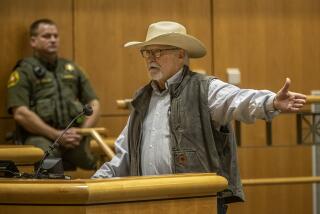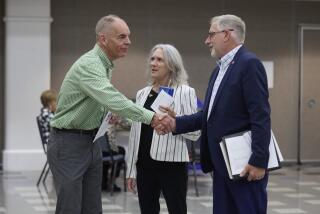Rivals clash over elections in Iraq’s Anbar province
- Share via
RAMADI, IRAQ — Provincial elections that were meant to strengthen democratic rule in Iraq and distribute power more equally are now threatening to upend almost two years of peace in Anbar province, the vast western desert where Al Qaeda in Iraq once operated freely.
With preliminary polling results scheduled for release as early as today, tribes of the Anbar Awakening and other clans that helped U.S. forces crush the insurgency here have charged that Saturday’s elections were a sham. The tribes contend that they were double-crossed by the region’s government and suggest that violence will return to Anbar if their rivals continue to hold power.
At best, the dispute is pure political theater and will end with the rivals sharing power. At worst, the struggle will spark a new cycle of bloodshed.
Any return to violence would carry deep consequences. The Bush administration regarded as a key success the cultivation of the Awakening tribes as allies against Islamist militants. The alliances have served as a model for operations throughout Iraq and in Afghanistan.
“An honest dictatorship is better than a fake democracy,” the Awakening’s leader, Sheik Ahmed Buzaigh abu Risha, declared Wednesday from his heavily guarded compound in Ramadi. “There will be very harsh consequences if this false election stands. We won’t let them form a government.”
Tribal sheiks and their followers here in Ramadi, the provincial capital, and in Fallouja charge that their political rivals gained control of local election offices and stuffed ballot boxes the day after the elections. Election officials reported that 40% of eligible Anbar voters cast ballots, but tribal candidates say the turnout was half that and that the additional votes are false.
The Independent High Electoral Commission sent a special delegation to the province Wednesday to investigate the claims.
“We do not believe in these results, and we will not work with the next provincial government,” Sheik Hameed Farhan Hays said over tea in his estate’s ornate meeting hall. Hays fought Al Qaeda in Iraq operatives in Ramadi in the early days of the Awakening movement.
The power struggle in Anbar is unlike any other in Iraq, as it pits Sunni Arab against Sunni Arab. In one corner are the Awakening tribes, those clans that boycotted the elections four years ago and battled U.S. forces before ultimately turning their weapons against Al Qaeda in Iraq. In the other is the Iraqi Islamic Party, one of the few Sunni political groups that bought into the political process from the beginning.
Enmity between the Iraqi Islamic Party, or IIP, and the tribes is rooted in the party’s quick rise to power after the 2005 provincial elections, when fewer than 2% of Anbar’s registered voters cast ballots. From that point on, tribal leaders say, IIP members sought only to enrich themselves at the people’s expense -- a charge the party rejects.
Over the last four years, the party has been accused by the tribes of mismanaging contracts worth tens of millions of dollars for medical facilities and communications networks.
“They are liars!” Hays boomed. “They claim to be religious, but we have pictures of them with their girlfriends, hugging and standing under a tree!”
For their part, the tribes have failed to present a united front and provide voters with an alternative to the IIP. Critics say they are just as focused on enriching themselves with contracts handed out by the U.S. military, whose support elevated their status and upset the age-old pecking order here.
“It’s not a political party. It’s a bunch of rather quarrelsome individuals who are claiming popular support,” said analyst Toby Dodge of the International Institute for Strategic Studies in London.
The governor of Anbar knows a thing or two about quarrels and violence. During his first year or more in office, he and his fellow IIP members could do little but hunker down in their Ramadi offices and count the attacks by insurgents. There was a government in name only.
Things began to change in 2006 with the beginning of the Awakening movement. Today, streets that were once traveled only by gunmen and the military teem with traffic. And not far from where graffiti once promised to make “Iraqi earth the cemetery for Americans,” a new souk is jammed with fresh produce and household items.
“The fact that you can even visit us is an accomplishment of the Awakening,” Abu Risha, who inherited leadership of the movement when insurgents assassinated his brother in 2007, told a Times reporter coolly. “If it weren’t for us, you would have been kidnapped in Fallouja, had your head cut off and shown on TV.”
Gov. Mamoun Sami Rasheed said his opponents are unlikely to stand in the way of peace and progress, after the city has been through so much. He dismisses the tough, angry talk of his rivals as posturing.
“Maybe they’re saying these things now, but wait one week,” he said. “They will shut their mouths and begin working with us. I believe this. There is no problem. We are all related and we are from the same tribes. Either we agree or Ramadi will be destroyed.”
The anger of the tribal groups was touched off by rumors that the IIP had won 43% of the vote, making it the leader of the pack. The governor said Wednesday that he was unaware of what the tally was. But he carried himself with the cheer of a man who had received good news.
Meanwhile, in the streets near the governor’s office, several people said they had voted for neither the IIP nor the tribal groups. They also dismissed the claim that it was the Awakening alone that brought security to the province.
“God brought security, not the Awakening,” said Hussein Hewari, a retired Iraqi army general. “They brought security for themselves, with the help of the Americans.”
Asked whether he thought the tribes might cause trouble after the election results are announced, Hewari thought a moment. “There is a possibility that they will cause trouble,” he said. “Yes, I think they will cause trouble.”
--
A special correspondent in Ramadi contributed to this report.
More to Read
Sign up for Essential California
The most important California stories and recommendations in your inbox every morning.
You may occasionally receive promotional content from the Los Angeles Times.











